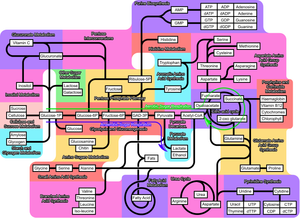I’m not a usually a fan of biochemistry, but in trying to come up with something in biology that fills me with awe I can’t get away from the metabolic pathways that I learned about in my first couple of years at university.
When people use the word ‘awe’ in science they’re typically thinking of things that are very complex, intricate, precise, ordered, powerful in some way, and perhaps also beautiful. The discovery of systems that display these traits can be completely unexpected, as when Werner Heisenberg discovered the organisation of energy levels in the atom.
‘In the first moment I was deeply frightened. I had the feeling that, through the surface of atomic phenomena, I was looking at a deeply lying bottom of remarkable internal beauty. I felt almost giddy at the thought that I had now to probe this wealth of mathematical structures that nature down there had spread before me.’
Heisenberg, in Cantore, Scientific Man
Heisenberg was shocked by his discovery of order in the atom, which completely transformed our understanding of the periodic table. I think metabolism is equally important, if a little messier and less beautiful.
All organisms that ‘breathe’ oxygen generate their energy through the Krebs cycle. Carbohydrates, fats and proteins are broken down into acetate, which goes through a series of reactions to generate energy-carrying molecules that power the life of the organism. A number of other useful molecules are also produced on the way. The Kerbs cycle was discovered in the 1930s, through what must have been a series of painstaking experiments that earned Hans Krebs and Albert Szent-Györgyi a Nobel prize.*
What fills me with awe when it comes to metabolic pathways like the Krebs cycle is the intricacy of the process. There is incredible sub-microscopic detail here: a chain reaction of molecules that would look very uninteresting in a test tube but are vital for keeping us alive. The cycle is robust: these reactions will continue to happen inside our bodies whether we look after them or not. And on a global scale it is incredibly powerful. The Krebs cycle was happening long before words of any kind – let alone ‘Krebs’ – were articulated by human beings, and it occurs in every aerobic (oxygen-using) organism on the planet. Our best efforts to replicate this system would result in a clumsy copy that lacked the compactness and precision of the original pathway in a living organism.
I don’t expect everyone to share my feelings about metabolism, but if you look at stars, weather systems or microscopic creatures, and find out more about them you might be filled with a similar sense of stunned wonder.
I think most scientists, at some point in their lives, will feel this emotional reaction in response to what they see in their work. There’s a rational dimension to it as well: deep understanding of the way the world works results in deep awe. These are the high points of a scientist’s career, and a reward for the daily grind of life in the lab. This sort of awe stops you in your tracks and you need a few minutes to take it all in. You feel surprise, admiration, delight – maybe even reverence, respect or fear. The moment takes you over and makes you focus. It is a significant encounter that you will probably remember for some time, if not the rest of your life – like my first encounter with a Zebrafish larva. You want to share the experience so you call others over to look, or spend time explaining what happened. You might even become a bit boring as you tell and retell the story… Most importantly, awe can make you think about a whole range of things: scientific, aesthetic, philosophical, perhaps even spiritual.
I have invited number of colleagues to share their comments and experiences on awe. Feel free to add yours!
* And I think I know why this particular pathway was named after only one of the discoverers… A Bancewicz cycle is also unlikely – the fact that I have left lab science won’t help either.




